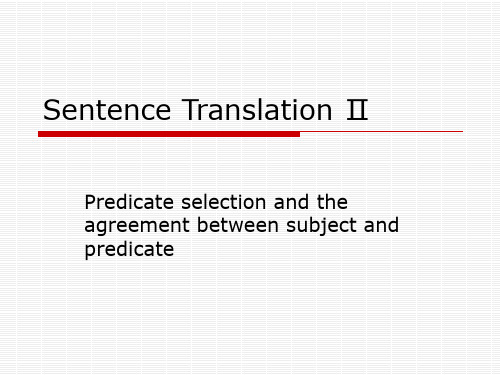句子翻译 (2)
- 格式:ppt
- 大小:451.50 KB
- 文档页数:29

小学四年级英语句子翻译练习题(2)小学四年级上册英语四会句子1. This is my computer. 这是我的电脑 That is your computer.那是你的电脑.2. Is this a teacher’s desk? 这是讲桌吗? Yes, it is.是,是的.3. Its 9:45. 九点四十五了It’s time for math class.,到上数学课时间了.4. What time is it? 几点了? It’s two o’clock.两点了.5. Is this your T-shirt? 这是你的T恤衫吗? No, it’s not.不,不是的.6. What colour is it? 它是什么颜色? It’s white.白色.7. It’s warm today. 今天很暖和. Let’s play football.让我们去踢足球吧.8. It’s cool. 很凉爽. Is it cold? 很冷吗? Yes, it is.\No,it isn’t.是,是的./不,不是.9. How much is it? It’s ten yuan.它多少钱?十元.10. How much are they? 它们多少钱? They’re three yuan. 三元.11. Are they ducks? 他们是鸭子吗? No,they aren’t.不,不是的.12. How many horses are there? 有多少匹马? Twelve. 12匹. 小学四年级下册英语四会句子1、现在几点钟? What time is it ?2、现在九点钟。
It’s 9 o’clock.3、该是上学的时候了。
It’s time to go to school.4、该是上英语课的时候了。
It’s time for English class.5、这是我们的教室。

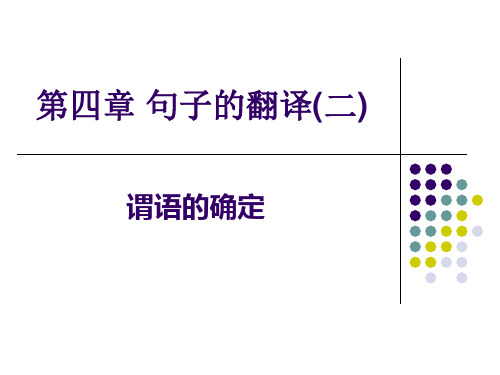


《史记》选读重点句子翻译《太史公自序》(1)孔子为鲁司寇,诸侯害之,大夫壅之。
译文:孔子担任鲁国司寇,诸侯嫉恨他,卿大夫阻抑他。
(2)察其所以,皆失其本已。
译文:考察他们所以会这样的原因,都是丢掉了立国立身的根本(礼义)。
(3)夫礼禁未然之前,法施已然之后;法之所为用者易见,而礼之所为禁者难知。
译文:礼是在坏事发生之前加以防范,法是在坏事发生之后予以惩处;法施行的作用容易看到,而礼禁绝的作用却难以察觉。
(4)存亡国,继绝世,补敝起废,王道之大者也。
译文:恢复已经灭亡的国家,延续已经断绝了的世系,补救偏颇之事,振兴废弛之业,这是王道的精髓。
(5)此人皆意有所郁结,不得通其道也,故述往事,思来者。
译文:这些人都是心中聚集了愤懑,不能实现自己的主张,因而追述往事,寄希望于后来人。
《夏本纪》(1)行视鲧之治水无状,乃殛鲧于羽山以死。
译文:(舜)在巡行中发现鲧治水实在不像话,就把鲧流放到羽山,后来鲧就死在那里。
(2)天下皆以舜之诛为是。
译文:天下的人都认为舜对鲧的处置是正确的。
(要点:以、诛、是)(3)女其往视尔事矣。
译文:你还是赶快去办你的公事吧!(要点:女、其、尔事)(4)于是帝锡禹玄圭,以告成功于天下。
译文:于是帝舜赐给伯禹一具玄圭,用它向天下宣告大功告成。
(5) 禹伤先人父功之不成受诛,乃劳身焦思,居外十三年,过家门不敢入。
译文:禹为先父伯鲧因治水无功而受严惩深感痛心,因此劳身苦思,在外十三年, 经过自己的家门也不敢进入。
《鲁周公世家》(1)王其无害,旦新受命三王,维长终是图。
译文:您不会有灾祸的。
我刚接受三位先王之命,让您只须考虑周室天下的长远之计。
(2)我之所以弗辟而摄行政者,恐天下畔周,无以告我先王太王、王季、文王。
译文:我之所以不避嫌疑代理国政,是怕天下人背叛周室,没法向我们的先王太王、王季、文王交代。
(3)为人父母,为业至长久,子孙骄奢忘之,以亡其家,为人子可不慎乎!译文:做父母者,经历长久时期创业成功,其子孙骄奢淫逸忘记了祖先的困苦,毁败了家业,做儿子的能不谨慎吗?《高祖本纪》1、召诸县父老豪桀曰:“父老苦秦苛法久矣,诽谤者族,偶语者弃市。
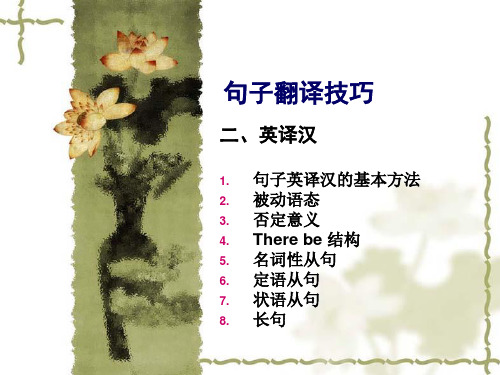

一、根据要求翻译或完成句子:
1.我的母亲,我生命中最重要的人,,一直坚信我终有一天会取得成功的。
(同位语;定语从句)
2.随着微信的快速发展,越来越多的人讲它用于学习,从中他们既可以获得一些技能也可丰富他们的生活。
(with复合结构;as引导的状语从句)
3.沿着小路走着,我们感到非常的惬意,伴随着太阳灿烂地照耀着,伴随着威风轻轻地吹着,伴随着美丽的花儿对我们微笑着,伴随着鸟儿在树上唱着甜美的歌。
4.你不但要和它们分享你的学习经验,而且一定要和他们敞开心扉。
(倒装句)
5.他又迟到了,让老师很生气。
(doing作主语;独立主格结构)
6.正是在他工作的那家工厂里我开始认识了他。
(强调句)
7.我们跟随的这个人突然停下来,好像是要弄明白是否走对了方向。
8.这是她一生中品尝过的最好吃的东西。
(Never开头的倒装句)
9.我听腻了室友老是自我怜悯,说要得到好分数是多么的难。
10.当我走在乡间的田野边上,童年的记忆如同潮水般涌现。

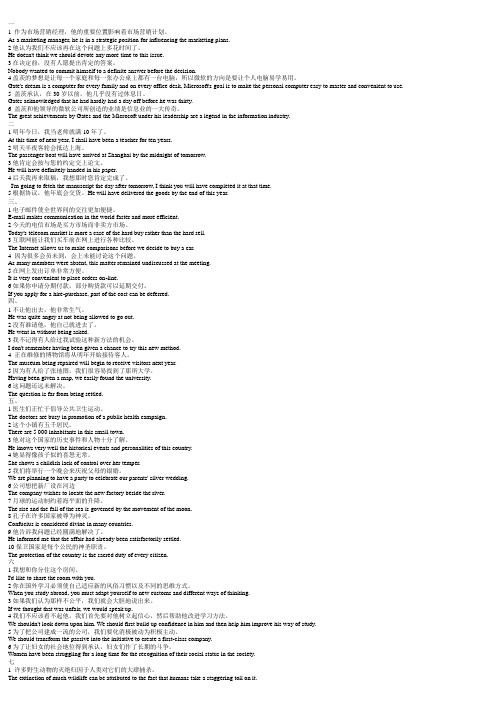
一1 作为市场营销经理,他的重要位置影响着市场营销计划。
As a marketing manager, he is in a strategic position for influencing the marketing plans.2他认为我们不应该再在这个问题上多花时间了。
He doesn't think we should devote any more time to this issue.3在决定前,没有人愿提出肯定的答案。
Nobody wanted to commit himself to a definite answer before the decision.4盖茨的梦想是让每一个家庭和每一张办公桌上都有一台电脑,所以微软的方向是要让个人电脑易学易用。
Gate's dream is a computer for every family and on every office desk, Microsoft's goal is to make the personal computer easy to master and convenient to use.5 盖茨承认,在30岁以前,他几乎没有过休息日。
Gates acknowledged that he had hardly had a day off before he was thirty.6 盖茨和他领导的微软公司所创造的业绩是信息业的一大传奇。
The great achievements by Gates and the Microsoft under his leadership are a legend in the information industry.二1明年今日,我当老师就满10年了。
At this time of next year, I shall have been a teacher for ten years.2明天半夜客轮会抵达上海。
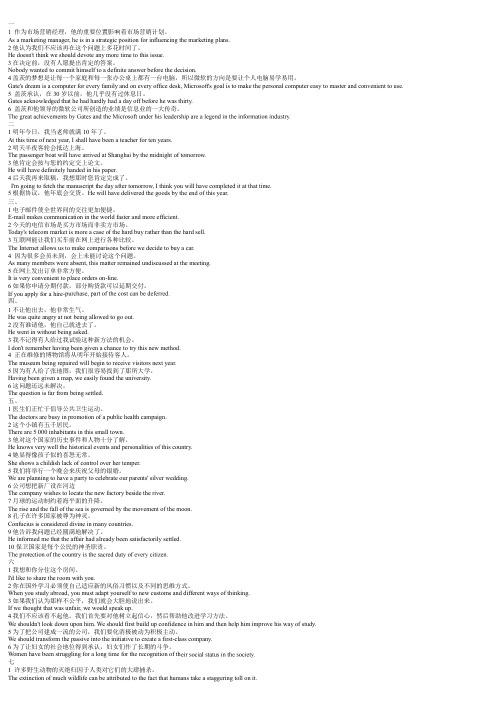
一1 作为市场营销经理,他的重要位置影响着市场营销计划。
As a marketing manager, he is in a strategic position for influencing the marketing plans.2他认为我们不应该再在这个问题上多花时间了。
He doesn't think we should devote any more time to this issue.3在决定前,没有人愿提出肯定的答案。
Nobody wanted to commit himself to a definite answer before the decision.4盖茨的梦想是让每一个家庭和每一张办公桌上都有一台电脑,所以微软的方向是要让个人电脑易学易用。
Gate's dream is a computer for every family and on every office desk, Microsoft's goal is to make the personal computer easy to master and convenient to use.5 盖茨承认,在30岁以前,他几乎没有过休息日。
Gates acknowledged that he had hardly had a day off before he was thirty.6 盖茨和他领导的微软公司所创造的业绩是信息业的一大传奇。
二1明年今日,我当老师就满10年了。
At this time of next year, I shall have been a teacher for ten years.2明天半夜客轮会抵达上海。
The passenger boat will have arrived at Shanghai by the midnight of tomorrow.3他肯定会按与您的约定交上论文。
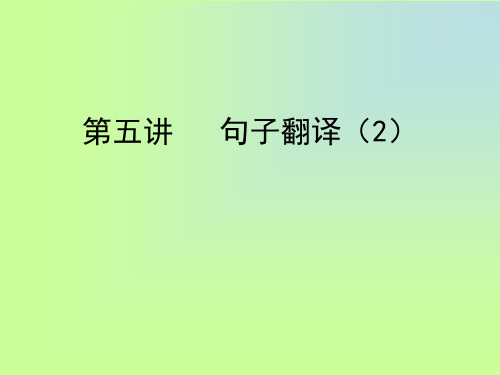
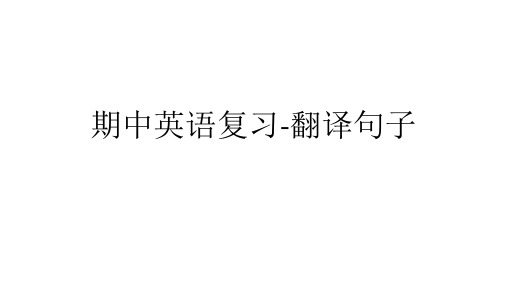

句子翻译主语+谓语1.他家住在马路对面。
2.会议开了两个小时。
3.今年麦子长得很好。
4.我们在海滩玩了一个下午。
5.下午四点半我们回到了学校。
6.我们学习很努力。
主语+谓语+宾语1.我们应该每天练习讲英语。
2.医生劝我不要抽烟。
3.学校安排我们班今天下午参观一个展览。
4.盼来信。
5.这照片使我想起了我的快乐童年。
6.吃这种药可以防止你感冒。
主语+系动词+表语1.他的梦想实现了。
2.我希望你快点痊愈。
3.这台机器出了毛病。
4.他们听到这消息很激动。
5.踢足球时他受伤了。
6.周末这大街变得很拥挤。
There be 句型1.明天有一个会。
2.传来呼救声。
3.昨天买的那台电脑出了故障。
4.三班和四班将举行一场篮球赛。
5.没有必要担心他的安全。
6.今天有几位学生没有来上课。
It is +adj.+that从句;It is +过去分词+that从句;常用“adj”有possible, obvious, clear, important, sure , certain, likely ,natural ,strange等。
常用“过去分词”有:said, known, believed, thought, found, suggested, expected, hoped, supposed 等。
1.有人建议明天去参观长城。
2.最要紧的是马上送他到医院。
3.据称这部电影明年上映。
4.期望明年有个好收成。
5.他肯定能成功。
6.很可能明天要下雨。
带“it”之类的句型It is time for sb to do sth 该是某人做…的时候了It takes +人+时间 +to do sth 做~花了某人多少时间It is / was +强调部分+that 正是~It is the first (second) time that sb did sth 第一次~It is one’s turn to do 轮到某人做~It is +公里数+ from A to B A地距离B地有多少公里1.坐公共汽车上学需要一个半小时。
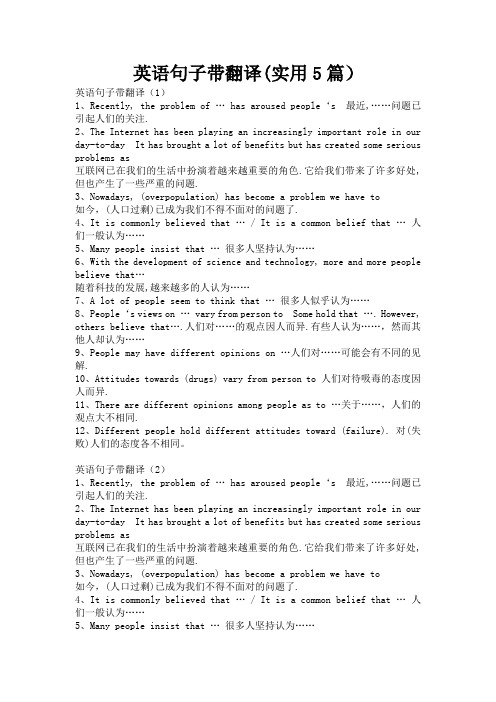
英语句子带翻译(实用5篇)英语句子带翻译(1)1、Recently, the problem of … has aroused people‘s 最近,……问题已引起人们的关注.2、The Internet has been playing an increasingly important role in our day-to-day It has brought a lot of benefits but has created some serious problems as互联网已在我们的生活中扮演着越来越重要的角色.它给我们带来了许多好处,但也产生了一些严重的问题.3、Nowadays, (overpopulation) has become a problem we have to如今,(人口过剩)已成为我们不得不面对的问题了.4、It is commonly believed that … / It is a common belief that …人们一般认为……5、Many people insist that …很多人坚持认为……6、With the development of science and technology, more and more people believe that…随着科技的发展,越来越多的人认为……7、A lot of people seem to think that …很多人似乎认为……8、People‘s views on … vary from person to Some hold that …. However, others believe that….人们对……的观点因人而异.有些人认为……,然而其他人却认为……9、People may have different opinions on …人们对……可能会有不同的见解.10、Attitudes towards (drugs) vary from person to 人们对待吸毒的态度因人而异.11、There are different opinions among people as to …关于……,人们的观点大不相同.12、Different people hold different attitudes toward (failure). 对(失败)人们的态度各不相同。

1.我能认出这块表是我的,因为表的背面有划痕。
I can identify this watch as mine by the scratches on the back.2.他嗜巧克力如命,吃的停不下来。
He was so addicted to chocolate that he couldn't stop taking it.3.史密斯先生从教学岗位上退休下来以后,开始从事摄影这一兴趣爱好。
Mr. Smith took up photography as a hobby after he retired from teaching.4.相比较起来,这幢房子的优点是价格低,而那幢房子的优点是交通便利。
By comparison, this house has the advantage of low price, but that house has the advantage of convenient transportation.5.他似乎正在使出全身解数,试图提高这一新产品的销售额。
It seems that he is making every effort to promote the sale of this new product.6.热切的学生们纷纷挤进了讲堂,聆听来自剑桥大学的那位著名教授讲课。
The eager students crowded into the lecture hall to hear the famous professor from Cambridge University.7.他们责怪他向队友发出的信号混乱不清。
They blamed him for sending confusing signals to the teammates.8.我们的产品仍然远远领先于我们竞争对手的产品。
Our product still has a good lead over that of our competitor.1.我不知道他如何能靠自己的薪水买得起一套新房子。
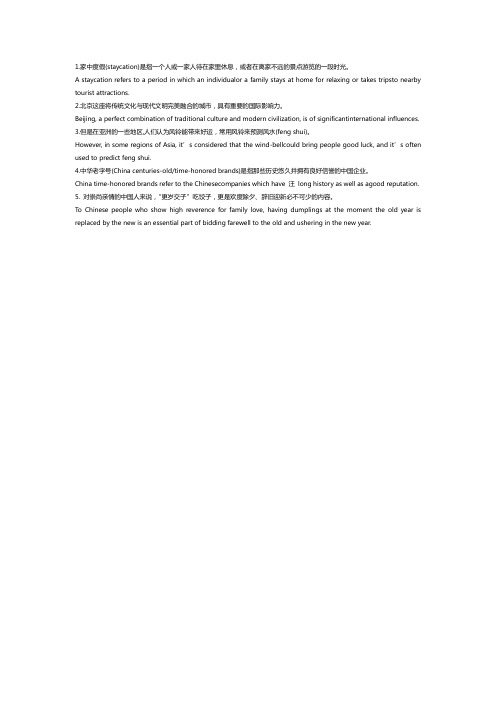
1.家中度假(staycation)是指一个人或一家人待在家里休息,或者在离家不远的景点游览的一段时光。
A staycation refers to a period in which an individualor a family stays at home for relaxing or takes tripsto nearby tourist attractions.2.北京这座将传统文化与现代文明完美融合的城市,具有重要的国际影响力。
Beijing, a perfect combination of traditional culture and modern civilization, is of significantinternational influences.3.但是在亚洲的一些地区,人们认为风铃能带来好运,常用风铃来预测风水(feng shui)。
However, in some regions of Asia, it’s considered that the wind-bellcould bring people good luck, and it’s often used to predict feng shui.4.中华老字号(China centuries-old/time-honored brands)是指那些历史悠久并拥有良好信誉的中国企业。
China time-honored brands refer to the Chinesecompanies which have 汪long history as well as agood reputation.5. 对崇尚亲情的中国人来说,“更岁交子”吃饺子,更是欢度除夕、辞旧迎新必不可少的内容。
To Chinese people who show high reverence for family love, having dumplings at the moment the old year is replaced by the new is an essential part of bidding farewell to the old and ushering in the new year.。
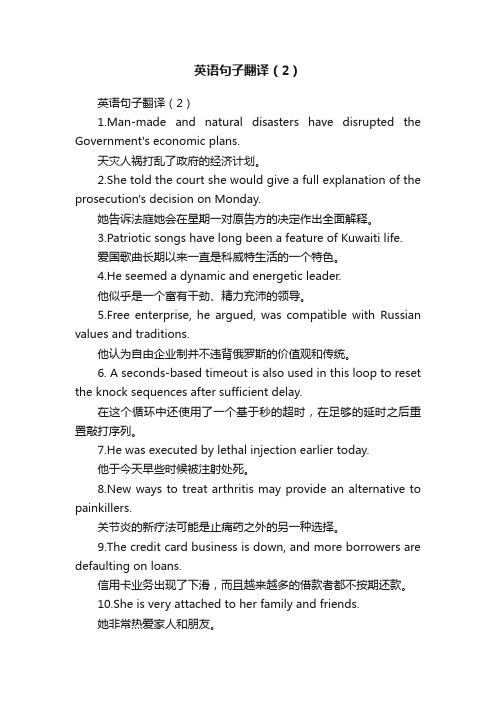
英语句子翻译(2)英语句子翻译(2)1.Man-made and natural disasters have disrupted the Government's economic plans.天灾人祸打乱了政府的经济计划。
2.She told the court she would give a full explanation of the prosecution's decision on Monday.她告诉法庭她会在星期一对原告方的决定作出全面解释。
3.Patriotic songs have long been a feature of Kuwaiti life.爱国歌曲长期以来一直是科威特生活的一个特色。
4.He seemed a dynamic and energetic leader.他似乎是一个富有干劲、精力充沛的领导。
5.Free enterprise, he argued, was compatible with Russian values and traditions.他认为自由企业制并不违背俄罗斯的价值观和传统。
6. A seconds-based timeout is also used in this loop to reset the knock sequences after sufficient delay.在这个循环中还使用了一个基于秒的超时,在足够的延时之后重置敲打序列。
7.He was executed by lethal injection earlier today.他于今天早些时候被注射处死。
8.New ways to treat arthritis may provide an alternative to painkillers.关节炎的新疗法可能是止痛药之外的另一种选择。
9.The credit card business is down, and more borrowers are defaulting on loans.信用卡业务出现了下滑,而且越来越多的借款者都不按期还款。
